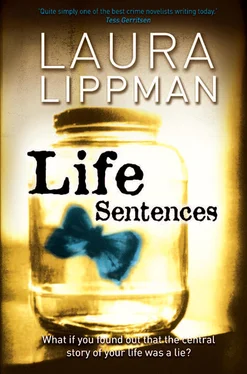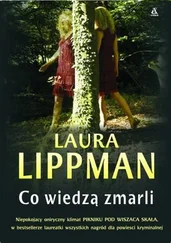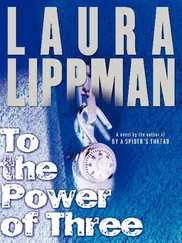‘Because it’s your story.’
‘It was. Somehow it became yours.’
She weighed what he was saying. A complaint? An acknowledgment of a literal truth? Or something in between?
Yet her father had always seemed proud of her book. She remembered the first local signing, the one where no one had come, in a struggling independent in downtown Baltimore. Cassandra didn’t have many friends left in the city. Her friends were from college, her years in New York. In New York, at her first-ever publication party, the bookstore had been full of friends and publishing types, and there had been a dinner afterward in a restaurant. In Baltimore, where the publicist had assumed she would be championed as a hometown girl made good, there were exactly five people: her father and Annie, her mother and her mother’s best friend, and a woman who had clearly misunderstood the thrust of the book, believing it a history of the civil rights movement in Baltimore. The evening was notable, however, for it marked the first time since Cassandra’s high school graduation that her parents and Annie had been in the same room. (A midyear graduate from college, she hadn’t bothered to walk, just packed up her things and gone straight to a sublet on the Lower East Side, back when the Lower East Side was still the Lower East Side.)
She had been nervous that night, reading in front of her parents. And Annie. The section she had earmarked for bookstore appearances suddenly seemed inappropriate, centering as it did on her attempt to re-create the moment her father met Annie. Her parents had raised her to be direct and down-to-earth about sex, but did that apply to their own sex lives? Her mother had explained the biology of the matter to her when she was eight, while her father had spent his life instructing her in the more indefinable nature of desire. She had been six or seven when her father had pointed out a woman near the Konstant Kandy stand in Lexington Market. ‘That woman,’ he said, gesturing with the spoon from his ice cream, ‘has a magnificent ass. In Portnoy’s Complaint , Philip Roth compared such an ass to a peach, or maybe it was a nectarine, but that’s a little flat-footed for me. What do you think? A cello, perhaps, or an amaryllis bulb, with the backbone stretching up like the stem, the head the flower?’ No, the timing was off, for Roth’s book certainly wasn’t around when she was six. In fact, she remembered seeing its yellow cover on her father’s nightstand, in the apartment he shared with Annie, and thinking, He says he’s too strapped to get me new shoes, yet he buys himself hardcover books . But her father considered books as essential as food. He would have been baffled if anyone suggested not buying the book he wanted the moment he wanted it. Besides, her father’s library was a gold mine for a dirty-minded girl. Cassandra had read Roth and Updike and Mailer. She read Candy , although she didn’t understand it until she read Voltaire in a college lit class. Her father’s contemporary books, much more than his library of classics, prepared her well for the world she entered. The books didn’t stop her from having a stupid affair with one of her college professors, but they armed her with the information that the professor didn’t have as much power as a young woman might assume.
For all of Cassandra’s hard-earned literary sophistication, she could not read the passage about her father and Annie in front of them. Or, for God’s sake, her mother and her friend, starchy Lillian. She read from the prologue instead, but she wasn’t prepared, and she tripped over words as if she had never seen them before. Later, her father and Annie took her to Tio Pepe’s—had they won or lost the coin toss? Cassandra wondered wryly—and her father tried to suggest that Lillian was a repressed lesbian who had been in love with Lennie for years, but even Annie found that ridiculous. ‘Oh, Ric,’ she said with a fluttering sigh, and he looked at her as if he could not believe she was his.
How sweet it had been, three years later, to return to Baltimore and speak in an auditorium at the Pratt library, the room brimming with people who had discovered the book in paperback. Women from reading clubs, in the main, but also some much younger girls, those who had their own problematic fathers, and even a few older men, the type who had studied her author photo a little too closely and thought they might help her with her daddy issues, whether they admitted that to themselves or not.
She wondered now if her father, despite all his years in classrooms, had a touch of stage fright.
‘You’re not nervous, are you?’
‘When have I ever been nervous to face an audience?’ he shot back. ‘Besides, you do all the work, right? You’re going to ask the questions, and I’m going to answer.’
‘Well, they bill it as a conversation. It wouldn’t be wrong if you had a few questions for me.’ Her voice caught; she had stumbled into an old psychic tar pit, her father’s incuriosity about her life. Cassandra knew the various ways her father might describe a woman’s ass, but he wasn’t sure what either of her husbands had done for a living. Ah, but if she had pressed him on it, he would have said, ‘Well, neither one stuck around.’
‘Sure, sure,’ he said now. ‘I’ll lob you a few softballs.’
‘And you’ll talk about Annie?’ Probing, careful.
‘What do you mean?’
‘About meeting her, the circumstances.’
‘If need be. But, you know, it doesn’t matter—’
‘Of course it matters.’
‘I didn’t need a riot. I would have met her some way, somehow. Annie was my destiny.’
That had always been the rationalization, but there was no doubt that her father had come to believe it. He hadn’t cheated on her mother; he had encountered his destiny and he knew enough not to defy the Oracle of Delphi. Yet her father didn’t acknowledge destiny in any other aspect of his life.
It was hard, trying to come to terms with the fact that her father had such a huge and ruling passion, much larger than any Cassandra had ever known. Sure, she knew what it was like to be swept away in the early part of a love affair, but she was amazed by those people who never seemed to abandon that wildness, that craziness. Would it have been easier if her father’s passion had been for her mother, or more difficult? In some ways, she was glad that her father’s big love was for someone other than her mother, because she at least had her mother to keep her company. Around her father and Annie, she had been lonely, the odd girl out. Especially as a teenager, she couldn’t help feeling that they spent their time with her wishing she would go away so they could have more sex. Of course, teenagers think the whole world is sex, all the time. But even now, as an adult with two marriages behind her, Cassandra still believed that her father’s sexual passion with Annie had an unusually long life span. If Annie left a room for even a moment, her father looked lost. When she returned, the relief that swept over his face was almost painful to see. He was crazy about her. That’s the kind of line her father would have red-lined in an essay as vague, imprecise, and overwrought. Yet it was true in his case. And Cassandra didn’t have a clue why.
Annie was beautiful, yes, the mild flaws of her face—the space between the front teeth, the apple roundness, the heavy brows that she never tended—balancing out the cartoonish perfection of her body. Sweet, too. Not unintelligent. But not sharp. This, more than anything, had bothered Cassandra, then and now. If her father, for all his snobbery, could choose a woman of ordinary intelligence, then what were the implications for his daughter? After an exceedingly awkward adolescence, Cassandra had grown into a reasonably attractive woman. Not necessarily pretty but sexy and appealing. Yet whenever she visited her father, she was reminded that the qualities that her father had taught her to value—intelligence, quickness—had nothing to do with the woman he declared the love of his life. The test of a first-rate mind, her father often said, quoting F. Scott Fitzgerald, was to hold two opposing thoughts simultaneously without going insane. Cassandra looked at herself, she looked at Annie, and she concluded that her father had a first-rate mind.
Читать дальше












